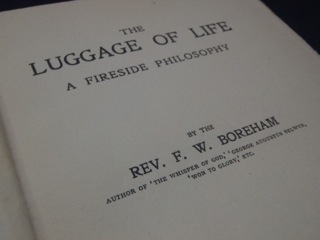Home > Books by F.W. Boreham > 1912, The Luggage of Life > The Luggage of Life
Chapter One
THE LUGGAGE OF LIFE
LIFE is largely a matter of luggage. So soon as a child can toddle he displays an insatiable passion for carrying things. He is never so happy as when he is loaded. His face beams with delight when his back is burdened to the point of breaking. A few months later he cries for a wooden horse and cart, that he may further gratify his inordinate longing for luggage. And, if these appetites be not humoured, he will exhaust his unconsecrated energies in pushing the chairs, tugging at tables, and carrying the cat. The instinct is there. You can no more deny him his load than you can deny him his lunch. The craving for both is born in him.
In his autobiography, Thomas Guthrie tells how the blood of the Scottish lads in his native village was stirred as the echoes of Waterloo reached that remote hamlet. ‘Many a time,’ he says, ‘did we boys tramp a mile or two out of town to meet troops marching to the war, and proud we were to be allowed to carry a soldier’s musket, which the poor fellows, burdened with all the heavy accoutrements of those days, and wearied with a twelve-hour march on a hot summer’s day, were glad enough to resign to us.’ Here is the same subtle law in operation, Man often loves without knowing that he loves ; and, little as he suspects it, he is deeply in love with his load. He groans beneath it, as a man grumbles at the wife of his bosom, but, if it were taken from him, he would be almost as disconsolate as if she were taken from him. When we were boys at school we learned ludicrous lessons about the weight of the air. How we laughed as we listened to the doctrines of Torricelli, and heard that every square inch of surface has to sustain a weight of fifteen pounds ! How we roared in our rollicking scepticism when our school masters assured us that we were each of us being subjected to a fearful atmospheric pressure of no less than fourteen tons !
But Mr. H. G. Wells has drawn for us a picture of men unladen. His heroes Mr. Cavor and Mr. Bedford have found their way to the moon. The fourteen tons of air are no longer on their shoulders. The atmospheric pressure is removed; they have lost their load, and they nearly lose their lives in consequence. They cannot control themselves. They can scarcely keep their feet on the soil. The slightest spring of the foot, and they bound like a ball into mid-air. If they attempt to leap over an obstructing boulder, they soar into space like larks, and land on a distant cliff or alight on an extinct volcano. Life becomes weird, ungovernable, terrible. They are lost without their load.
Which things are symbolic. It is part of the pathos of mortality that we only discover how dearly we love things after we have lost them. We behold with surprise our affections, like torn and bleeding tendrils, hanging desolate, lamenting mutely the com- monplace object about which they had entwined themselves. So is it with the lading and luggage of life. We never wake up to the delicious luxury of being heavily burdened until our shoulders miss the load that galled them. If we grasped the deepest philosophy of life a little more clearly we might perhaps fall in love with our luggage. The baby instinct is perfectly true. Our load is as essential to us as our lunch. Very few people have been actually crushed in this old world of many burdens. And those who have were not the most miserable of men. It will not be at all astonishing if the naturalists of to-morrow assure us that the animal world knows no transport comparable to the fierce and delirious ecstasy of the worm beneath the heel. It would only be a natural, and perfectly logical, advance upon our knowledge of Livingstone’s sensations beneath the paw of the lion. At any rate, it is clear that man owes as much to his luggage as a ship owes to her keel.
It seems absurd to build her delicately, and then burden her dreadfully. But the sailor loves the heavy keel and the full freight. It is the light keel and the empty hold that have most reason to dread the storm. Blessed be ballast ! is a beatitude of the forecastle.
Such is the law of life’s luggage. But the New Testament gives us a still loftier and lovelier word : ‘Bear ye one another’s burdens, and so fulfil the law of Christ.’ And these laws the law of nature and the law of Christ are not conflicting, but concordant. The one is the bud, the other is the blossom. For Christ came, not to remove life’s luggage, but to multiply our burdens. It is true, of course, that He said : ‘Come unto Me, all ye that labour and are heavy laden,’ but He only invited them that He might offer them His yoke and His burden. Here is something worth thinking about. Christ gives rest to the heart by giving burdens to the shoulders. And, as a matter of fact, it is in being burdened that we usually find rest.
The Old Testament records the sage words of an old woman in addressing two younger ones: ‘The Lord grant,” said Naomi, ‘that ye may find rest, each of you, in the house of her husband!’ Whoever heard of a woman finding rest in the house of her husband? And yet, and yet ! The restless hearts are not the hearts of wives and of mothers, as many a lonely woman knows. There is no more crushing load than the load of a loveless life. It is a burden that is often beautifully and graciously borne, but its weight is a very real one. The mother may have a bent form, a furrowed brow, and worn, thin hands ; but her heart found its rest for all that. Naomi was an old woman; she knew the world very well, and her words are worth weighing. Heavy luggage is Christ’s strange cure for weary hearts.
The law of life’s luggage the ‘law of Christ’ has a racial application. It is notorious that a Christian people is not physically more robust than a savage people. Readers of Alfred Russel Wallace’s Travels on the Amazon will remember that, the farther the intrepid voyager proceeded up the great waterway, the finer became the physique of the natives. And at last, when Dr. Wallace reached a point to which no white man had ever before penetrated, he discovered men and women any of whom might have posed as models for Grecian sculptors. The reason is obvious. The savage knows nothing of ‘the law of Christ.’ He will bear no other’s burden. The sick must die; the wounded must perish; the feeble must go to the wall. Only the mightiest and most muscular survive and produce another generation. ‘The law of Christ’ ends all that. The luggage of life must be distributed. The sick must be nursed ; the wounded must be tended ; the frail must be cherished. These, too, must be permitted to play their part in the shaping of human destiny. They also may love and wed, and become fathers and mothers. The weaknesses of each are taken back into the blood of the race. The frailty of each becomes part of the common heritage. And, in the last result, if our men are not all Apollos, and if our women do not all resemble Venus de Medici, it is largely because we have millions with us who, but for ‘the law of Christ’ operating on rational ideals, would have had no existence at all. In a Christian land, under Christian laws, we bear each other’s burdens, we carry each other’s luggage. It is the law of Christ, the law of the cross, a sacrificial law. The difference between savagery and civilization is simply this, that we have learned, in our very flesh and blood, to bear each other’s burdens and so fulfil the law of Christ.
We set out with Dr. Guthrie. Let us return to him. He is excellent company. He is describing, with a glow of satisfaction, one of the ragged- schools he established in Edinburgh. ‘I remember’, he says, ‘going down the High Street early one morning and seeing a number of our children coming up. One of them was borne on the shoulders of another, and, on my asking the reason’, he said that the little fellow had burned his foot the night before, and he was carrying him to school. ‘That,’ said the doctor emphatically, ‘would not have happened in any other school in Edinburgh.’ It is a parable. It is the law of life’s luggage. It is the law of Christ.
F.W. Boreham




















0 Comments